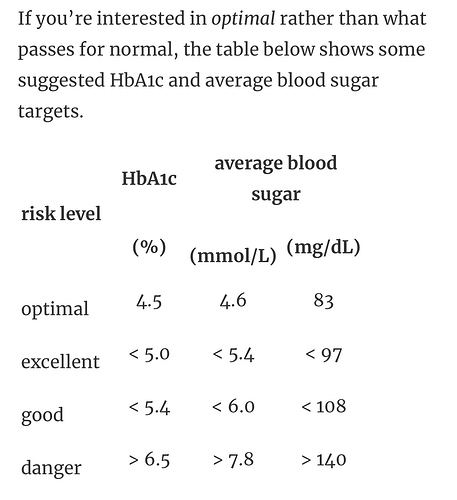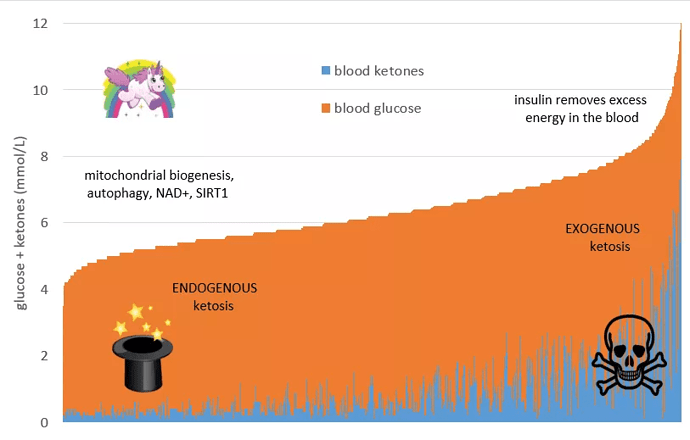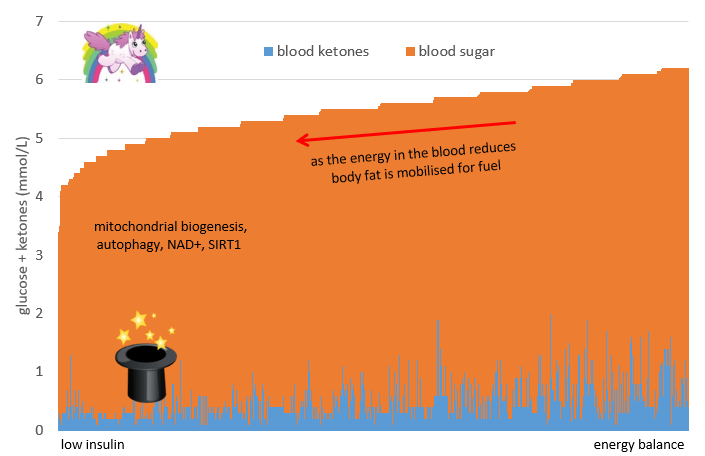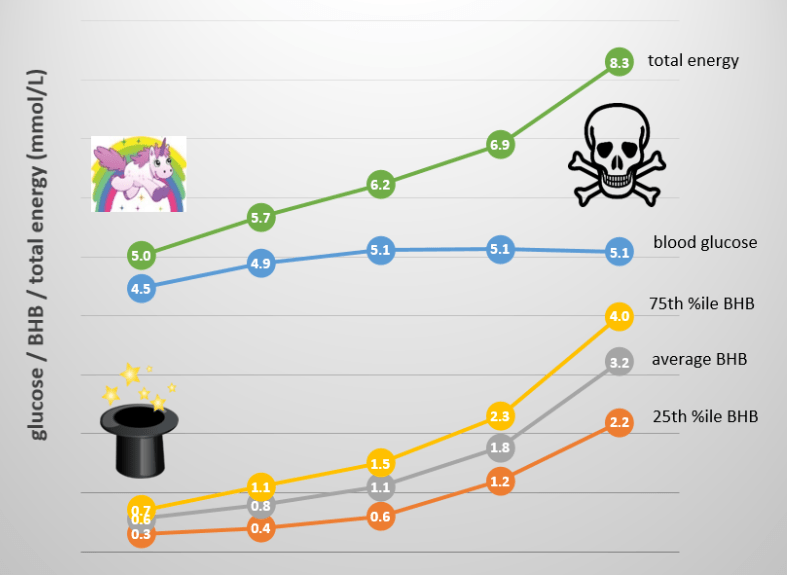Ugh, what would I eat? it’s all garbage… at least it’s cheap garbage… maybe I’ll make my mom’s sweet potato casserole.
LP-IR Score & FASTER Study
Oh, it’s brain actually and any other tissue like red blood cells that cannot use ketones.
If you’re strict keto, you’re also teaching your liver to be stingy with the gluconeogenesis and only make what it needs.
Also the physiological insulin resistance is a bit of a misnomer cause it’s the down-regulation of the receptors, not because the receptor is becoming numb to the signal.
I see, I was misunderstanding; pathological is liver and peripheral would be physiological insulin resistance.
Almost as if the receptors are working the way they are supposed to work; intermittently rather than just shutting off completely.
I’m re-reading that dietdoctor article now, and I think it is explained pretty well. Or at least it seems intuitive to me.
A high fasting glucose on a long term keto WOE is not a cause to worry but to prove it, you have to get your fasting insulin also measured. That gives you the HOMA-IR score, and if insulin is low and BG stable, even if high, that is a good outcome.
Now we just need a home Insulin test.
The muscle cells are happy running on ketones, and insulin is low, so there’s not any pressure to stuff the glucose anywhere. Muscle cells have a choice.
I maintain about a 70 mg/dl more + or less - on like a three day or more fast. When it gets down in the 60’s it is time to eat.
I notice spikes (gluconeogenesis) in the glucose meter readings (making sure fingers are clear of any particulates like soap etc.) when monitoring every two or three hours.
Not sure how accurate it is though!
Maybe some time in the future a insulin, and cortisol meter, that would be so cool! Or the deluxe unit glucose, ketones, insulin and cortisol meter! Lol
I haven’t fasted for more than 24 hours prior to a blood draw but it looks like I’m trending towards the glucose sparing state:
These were taken around 8am at my GP’s via QuestDiagnostics.
Serum Glucose:
4/20/17: 68
7/24/17: 81
10/17/17: 82
Yep, I’m kicking myself for not demanding the fasting insulin. My doc was always ‘Nah, you don’t need it’ but more from a ‘save your money, kid’ frame.
Yep, need the dudes to write the kickstarter page and I’m sure it’ll take on a life of its own. I heard they aren’t afraid of a little technical detail. 
I like using this chart as a benchmark
Notice the lower blood ketone numbers (below)?
Side Note: “Exogenous” on the charts, I think is referring to ketones from DIETARY FAT (or exogenous pharmaceutical ketones?) NOT endogenous fat ketones from the body and why the ketone numbers or levels (fluctuate erratically even on decline) are so low as the fasting time increases or distancing the time in-between eating; utilizing glucose meter measurement targets (if my interpretation is correct?).
HOW TO USE YOUR BLOOD SUGAR METER AS A FUEL GAUGE (i.e. nutritional ketosis) ”…Will monitoring my blood sugars help me enter ketosis?
The most straightforward approach is just to measure your blood sugar levels when you feel hungry and not eat until they drop below your target level. You could still use this method even once you have improved your insulin sensitivity to losing weight by targeting even lower blood glucose levels before eating.
The chart below shows the sum of blood glucose and blood ketone levels for people on a low carb or ketogenic diet. While a low carb diet helps to stabilise blood sugar and removes hyperpalatable foods when benefits a many people in terms of weight loss and energy levels, some of the major benefits are reserved for the periods when we are in a low energy stage (e.g. reduced insulin levels, autophagy, mitochondrial biogenesis, increase in NAD+ and increase in SIRT1). It is in these periods of low energy that our body goes into cleansing and repair mode so it can survive through the famine to be able to reproduce in the next time of plenty.
Zooming in on the left hand side of the chart, we can see that it’s the periods when we drive the energy in our blood down through delaying eating or restricting energy intake that we get the major benefits often associated with a low carb or ketogenic diet.
You will likely have some blood ketones in your bloodstream when your blood glucose levels are low, but they may not be at the levels that many consider to be ‘optimal ketosis’. As shown in the chart below, if your blood glucose levels are at 4.5mmol/L or 80 mg/dL then you you might expect blood ketone levels to be somewhere between 0.3 and 0.7mmol/L. If your blood sugars are at 4.9mmol/L or 88 mg/dL your ketones might be somewhere between 0.4 and 1.1 mmol/L. …”
https://optimisingnutrition.com/2016/02/15/how-to-use-your-glucose-meter-as-a-fuel-gauge//
Interesting how BG will sort of track up with serum BHB. I guess I kinda thought they would be counter or strictly independent. Well, as much as BHB will fluctuate I guess I can’t say that.
Suppose it’s just more helpful to consider the whole energy level of BG+BHB in the blood.
Not that it’ll change my strategy for pre-workout, and pre-performance fasting/feeding.
Yeah. I know. I was a bit gentle on Greger in that article given the target audience is his fans to try to educate them about nutrient density and it’s not just all about not eating animals.
I was less subtle about how I really feel about Greger article (i.e. he’s primarily concerned with animal welfare, not human health and bends the science to suit that agenda).
You sure threaded that needle. To paraphrase Einstein if I may: Be as fair as possible, but no fairer!




